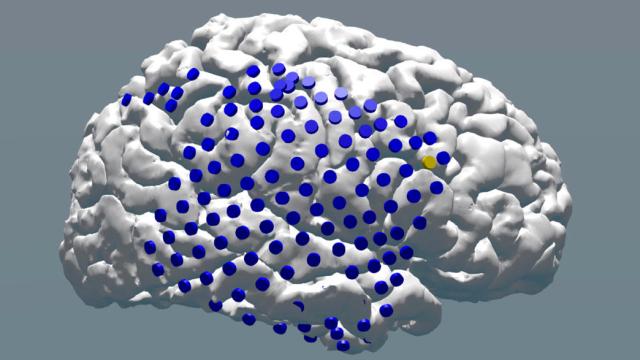Zapping the brain with small bursts of electricity in hopes of improving memory isn’t a brand new concept, however a new study shows that the experimental therapy could be more effective than previous studies indicated. A team of neuroscientist from the University of Pennsylvania are the first to successfully demonstrate that electrical stimulation to the brain can have restorative effects.
Image: University of Pennsylvania
The study, published in Current Biology, represents one of the most exhaustive projects on how this type of deep brain stimulation might potentially reduce signs of dementia and help combat memory loss resulting from head injuries and other traumatic brain injuries common in soldiers returning from wars in Afghanistan and Iraq.
The research was conducted as part of four-year project funded by the Department of Defence called “Restoring Active Memory“, the goal of which is development of a fully implantable device that will restore lost memory function. The study was conducted on a test group of individuals with epilepsy, as the condition can affect memory, and involved a series of memory tests in which the participants received stimulation to areas of the brain identified as related to memory encoding. The researchers stimulated brains in both high- and low-functioning states and found that while memory improved when stimulation occurred in the low-functioning state, participants actually scored lower than usual when stimulation occurred in an already high-functioning state.
As the New York Times reports, previous studies on deep brain stimulation have had mixed results. Some experts believe that electric stimulation of the brain sharpened memory, but others thought it only damaged the brain. This new research offers greater insight into these past successes and failures by demonstrating that it’s the timing of the stimulation that is key.
Though further research is need, the researchers posit these findings could make the case for something called a “closed-loop treatment” that involves using brain implants to send electrical pulses only when the device detects that they would be helpful. “The data suggest applications for closed-loop treatment of memory dysfunction,” the researchers said in a brief included in the research. The hope among many neuroscientists is that such applications could help treat symptoms of Alzheimer’s, dementia or other brain injuries.
The biggest takeaway from this study is that targeted electrical pulses can potentially help improve memory performance if they’re timed correctly. Scientists, of course, will continue to test this theory while also developing new ways to deliver these types of deep brain stimulations. For now, we still don’t have a cure for traumatic brain injuries — but this study certainly gives us a renewed sense of hope.
